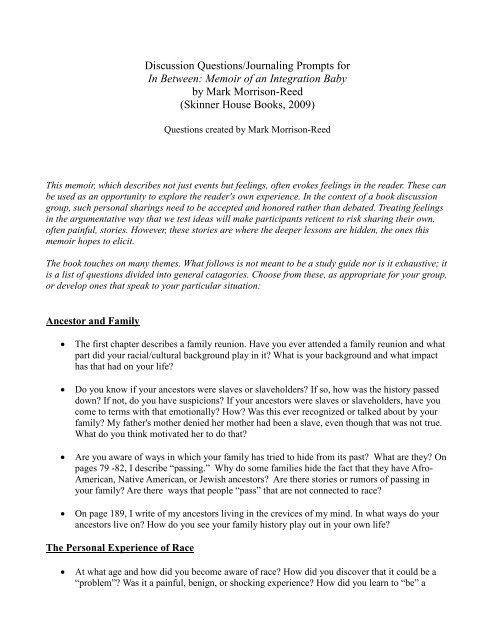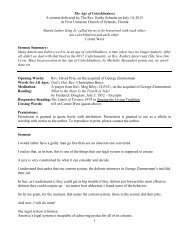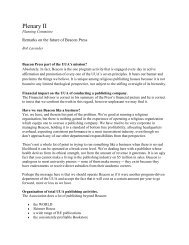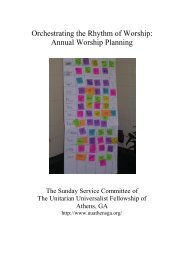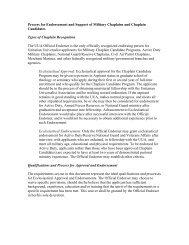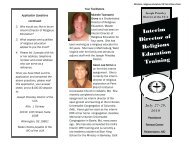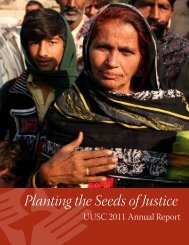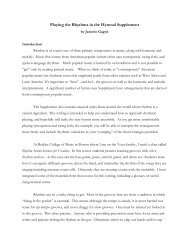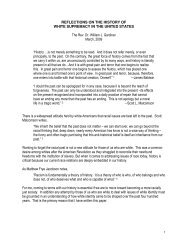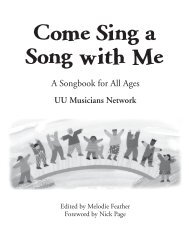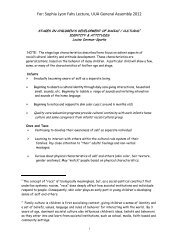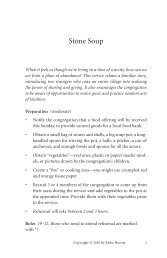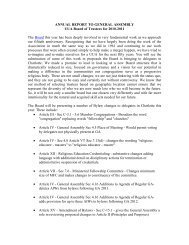Discussion Questions (PDF)
Discussion Questions (PDF)
Discussion Questions (PDF)
You also want an ePaper? Increase the reach of your titles
YUMPU automatically turns print PDFs into web optimized ePapers that Google loves.
<strong>Discussion</strong> <strong>Questions</strong>/Journaling Prompts forIn Between: Memoir of an Integration Babyby Mark Morrison-Reed(Skinner House Books, 2009)<strong>Questions</strong> created by Mark Morrison-ReedThis memoir, which describes not just events but feelings, often evokes feelings in the reader. These canbe used as an opportunity to explore the reader's own experience. In the context of a book discussiongroup, such personal sharings need to be accepted and honored rather than debated. Treating feelingsin the argumentative way that we test ideas will make participants reticent to risk sharing their own,often painful, stories. However, these stories are where the deeper lessons are hidden, the ones thismemoir hopes to elicit.The book touches on many themes. What follows is not meant to be a study guide nor is it exhaustive; itis a list of questions divided into general catagories. Choose from these, as appropriate for your group,or develop ones that speak to your particular situation:Ancestor and FamilyThe first chapter describes a family reunion. Have you ever attended a family reunion and whatpart did your racial/cultural background play in it? What is your background and what impacthas that had on your life?Do you know if your ancestors were slaves or slaveholders? If so, how was the history passeddown? If not, do you have suspicions? If your ancestors were slaves or slaveholders, have youcome to terms with that emotionally? How? Was this ever recognized or talked about by yourfamily? My father's mother denied her mother had been a slave, even though that was not true.What do you think motivated her to do that?Are you aware of ways in which your family has tried to hide from its past? What are they? Onpages 79 -82, I describe “passing.” Why do some families hide the fact that they have Afro-American, Native American, or Jewish ancestors? Are there stories or rumors of passing inyour family? Are there ways that people “pass” that are not connected to race?On page 189, I write of my ancestors living in the crevices of my mind. In what ways do yourancestors live on? How do you see your family history play out in your own life?The Personal Experience of RaceAt what age and how did you become aware of race? How did you discover that it could be a“problem”? Was it a painful, benign, or shocking experience? How did you learn to “be” a
member of the racial group that you identify with? Do you think people of different “races”learn about race differently?Were you ever rejected because of who you are? Too young? Old? Due to your gender?Religion? Class? Culture? Race? Sexual orientation? How did that experience affect you?Did you ever wonder about God's race or gender?As a child, I was told not to play with my friend Grover. Were you ever told not to play withsomeone? What were the unspoken rules in your home? In the story about Grover, the issue ofclass is entangled with that of race. What is your class background? What expectations camewith that?Do you, or have you, had close friends of another race? How did you meet?The Impact of Historical EventsDo you remember the bombing of the Sixteenth Street Baptist Church, the March from Selma toMontgomery, or Malcolm X’s assassination? Did these event have an impact on your life? Wasyour reaction to the assassination of President Kennedy different than your reaction to theseevents?In the chapter “The King is Dead, Long Live the King,” I recount how the assassination ofMartin Luther King Jr. affected my family. If you were of an age to remember, what impact didKing’s death have on you and those close to you? Was it different or similar to how it affectedmy family?Until 1967, when the U.S. Supreme Court ruled anti-miscegenation laws unconstitutional inLoving vs. Virginia, interracial marriage was illegal in Virginia and other southern states. Areyou in, or do you know someone who is in, an interracial marriage? What has your/theirexperience been?During the 2008 election campaign, Michelle Obama was called unpatriotic after she said - inreference to Barack Obama running for the presidency as it symbolized people's yearning for achange -- that it was the first time she was proud to be an American. This memoir also exploresthis Afro-American ambivalence. Why do you think so many Anglo-Americans were surprisedby her comment?Other <strong>Questions</strong> about RaceWhat challenges do multiracial children and the children of cross racial adoption and theirparents face? What might the blessings be?If we all have common ancestors and the so-called races have always been intermingling, whydoes the idea of race persist? And why does racism persist?W.E. B. DuBois wrote, “The problem of the twentieth century is the problem of the color line.”In the twenty-first century, is race of declining significance in the U.S.A? If so, why? If not,
why not?What does integration mean today?Afro- and Anglo-Americans often talk past one another when discussing race. In the book, Ipoint out that Afro-American anger (because of how African Americans were and are stillunfairly treated) and Anglo-American fear (of that anger) and guilt (over knowing the game wasand still is, to a lesser degree, rigged in Anglo Americans’ favor) makes for a volatile mixture.To feel heard, Afro-Americans need to know that their anger is recognized and affirmed, whileAnglo-Americans, in not wanting to feel bad about themselves, often claim they are helpless tochange the situation, didn't do anything themselves, or that it is all fixed now. This is interpretedby Afro-Americans as discounting their experience. Do you find race can be a “loaded” topicthat can be so difficult to talk about that it is usually avoided?Canada and the U.S. have different histories in regard to race, but nonetheless, my marriage to aCanadian posed a problem for her family, and not just because her mother was once anAmerican. Why do you think racial prejudice and tensions play out differently in Canada thanin the U.S.?Fear was something I was raised with. Today, some believe that living in fear is a thing of thepast, but stereotypes about Afro-American men still put them at risk everyday. Most Afro-Americans take this perspective for granted, while many Anglo-Americans find it surprizing.Why do you think this is so?On pages 63 – 66, I tell of attending my first Passover Seder, and later on pages 249 – 250, Imake an argument for Afro-Americans to create a Passover-like celebration. Do you agree?What might such a celebration look like and when would it be celebrated? What significancewould it have for Afro-Americans? Can you see any benefits in might have for otherAmericans?I argue that the terms we use to describe race--white and black are misnomers that inviteunnecessary polarization and oversimplification. Should we try to eliminate these words fromour personal vocabularies?A Final QuestionI describe my life as a “wayward journey toward wholeness.” What does wholeness mean to you? Andhow have your wounds and struggles blessed you?


